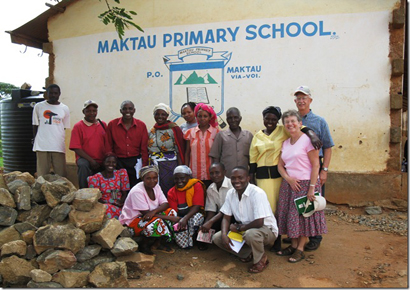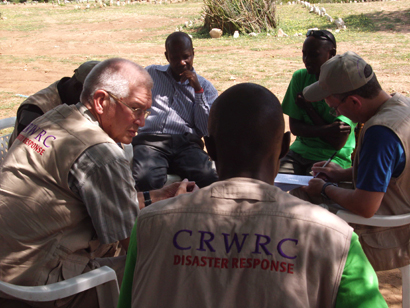CRWRC’s program to reach 170,000 people in East Africa with much-needed emergency food, water, and other supplies during a period of severe drought was carried out through CRWRC staff and partners, and also by 11 volunteer managers who gave months of their time to coordinate and manage projects. These volunteers are known as International Relief Managers and are part of a team of 26 people who have been trained and equipped to help CRWRC at a moment’s notice when the need arises. Here are their thoughts about the assistance that they helped provide.
|
|
In Kenya
“Out of thankfulness to the Lord for all that He has given to us we were pleased to have the opportunity to serve those in need through CRWRC,” said Rients and Margaret Mazereeuw of Lethbridge, Alberta, who coordinated food distributions in Kenya.
“We had an interesting and fruitful five months in Kenya, learning about and managing a food distribution that served 8,400 households with approximately eight people per household. Each month the beneficiary families would receive 50kg of maize, 10kg of split peas, 3 liters of oil, and ½ kg salt. Staff chosen by our partners, the Anglican Church of Kenya and the Reformed Church of East Africa coordinated all the work at the distribution sites. They were crucial to the program as it would have been impossible to manage the project without them. Dealing with suppliers as well as trying to ensure that the food arrived on time took up a large part of our time.Interacting with the people was one of the highlights of our project, as we witnessed the joy and thankfulness of the people as they received the relief food. The project gave us a new awareness how much we take our blessings at home for granted.”
Lee and Sue Mys of Fremont, Michigan agree. They also served in Kenya, but during their three months in the country they focused on providing reliable access to drinking water to families and communities in the coastal regions. This included trucking water to communities, constructing water tanks for schools, drilling a borehole, and digging water pans as part of a food-for-work project.
“We worked on a water project in the coastal regions of Kenya that involved water pans, and water catchment for schools. Two of our most memorable experiences were when the first truck of clean water was finally delivered to Bandari school and when we paid the water bill to turn on the water tap at Palakumi school. To see the children gather around and drink safe water was very rewarding. The school children made it one of the best experiences, with their big smiles and excitement. They said it tastes a lot better than river water or rainwater and now they even have enough water to wash their lunch bowls,” they said.
“One of my fondest memories of working in Northern Kenya (Turkana and West Pokot districts) was watching the children when the engineering team and I did a borehole pump flush,” added Bernie Schaaf of Tinley Park, Illinois, who also spent three months in Kenya. “The children had never seen that quantity of water gushing out, before. The women immediately filled their water containers. But the children were so thrilled to see the water – they had such big smiles. It was wonderful to watch the children so enjoy life for that moment.”
“Another fulfilling part of the work was that we were able to get water to an internally displaced person (IDP) camp. The community got water after the borehole drilling was completed. Previously, the people were walking 4km to get water from an irrigation ditch which was full of pollutants. Children were sick with diarrhea from the contaminated water, but now they had a safe water source. “
John and Hilda Van Gyssel of Elmira, Ontario rounded out the Kenya team of IRMs. They are still in Kenya completing the last of their three months in the country.
“With our work and interaction with the people of Kenya, John and I have made many new friends and are enjoying our time with them. We have heard stories that bewilder us, stories that amuse us and stories that make me cry. But throughout all these stories, we have seen a common thread. We have seen that the people of Kenya love their country and give of themselves completely to try to make it a better place for future generations,” said Hilda.
“When we go to the waterpans, some of which are nearing completion, the mood is cheerful as we are greeted by the beneficiaries singing and dancing for us. We are quick to join them as there is really something here to celebrate. In another month, we are hoping the long rains will fill the pans.
“The schoolchildren are so thankful that they no longer have to bring water to school. The children report that they can concentrate much better and the teachers say that the absenteeism rate is drastically reduced.
“In all these achievements we give thanks to God for being the ultimate provider. There is so much need here but the lives of many are being affected through this CRWRC and Pwani-CCS project. God has provided the means and the desire to help many of the families here in the coastal region of Kenya.”
In Ethiopia
Jack and Elly Dalmaijer of St. Albert, Alberta spent three months in Ethiopia. While there, they helped two local partners provide food to about 41,000 people.
“A group of five women of various ages came up to me. Their expressions of thankfulness went far beyond the clasped hand and words,” Elly recalled, when they were working in the village of Tore.
She found someone who could translate the women’s words for her. It was then that Elly found out that all five women had AIDS. As she sat on a rock, the women spoke to her through a translator and shared their stories.
"I have six children and I need special food because of my HIV,” said one woman, “After the drought, I did not even have porridge for myself because I gave any food first to my children. When they were eating the porridge I would lie down and then I would fall asleep.”
Others shared how they had survived by selling or eating their few animals. Now, none of them had any animals left. The CRWRC food rations had come just in time.
Despite losing their most recent harvest to the flooding, and despite the damage that the flood waters had done to their homes, the women had hope for their future. Their children were in school and they trusted that they could rebuild their lives now that they had received food aid.
“These women made a huge impression on me with their courage in the face of such crushing burdens,” said Elly, “I felt so proud and honored that these women trusted me with their stories and with their hugs and kisses. Then, as I thought about that group hug and our conversation, I realized that that’s really what it means to ‘embrace AIDS.’ It means to be a friend to those living with this disease. To be present with them and help them feel loved. It was just a blessing to be able to do that and feel their love in return.”
In Mozambique
“We were partnering with the Lui’a community to help restore three of their boreholes,” said Harry and Greta Harsevoort of Port Stanly, Ontario who spent three months in Mozambique.
“We had the privilege of actually seeing the pumps working and the clean water coming out, to see that water flow. The community members talked about people previously collecting water from the river and the health problems they had as a result. In some cases it was a long walk for women to get to the water source. Having a safe water source that was relatively nearby was a great improvement for the community.
Harry goes on to say “we enjoyed meeting with the community leaders, learning about their unique problems and needs. We enjoyed discussing with them how to change administrative procedures so that they will be able to manage to maintain their boreholes in the future. It was rewarding that this project initiated some vision, hope and self confidence within the community that with some help, they can work together to make a better future.”
To find out more about CRWRC’s International Relief Manager (IRM) Program, please contact Vanessa Mathews-Hanna or call 1-800-730-3490.







